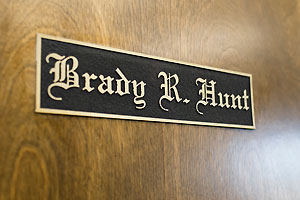FAQ’s
Q: Why do I need an Estate Plan?
A: Whether your Estate is large or small, having an estate plan will allow for the orderly distribution of your assets after your death. It can also direct what may happen in the event of your incapacity. An Estate plan can serve to preserve good family relations and settle potential disputes before they upset and /or destroy otherwise close families. A qualified attorney can save families literally thousands of dollars in potential future legal costs by properly preparing an estate plan which will take effect on death or disability.
Q: What homework should I do prior to meeting with you to develop my estate plan?
A: In order to advise our clients, and since all family situations are different and require different solutions, we ask that our clients fill out a short questionnaire which provides us with the family information and financial information necessary to properly advise our clients on what may be the right course of action for them. We review this information at the initial office conference. Based on this information, and your wishes, we are able to then explain the various options and their costs based on what is involved in your particular situation.
ALL YOUR INFORMATION WE OBTAIN IS PRIVILIDGED AND CONFIDENTIAL. IT IS KEPT SECURE AND IS NOT SHARED WITH ANYONE.
Q: What is the cost of the initial consultation?
A: There is no cost for the initial 30 minute consultation for wills, trusts, or personal injury matters. For other matters there may be a reasonable fee for services provided. As with all consultations, we analyze your situation, propose solutions and provide cost estimates. There is no obligation on your part to proceed further with our services.
Q. What is a Will?
A: A Will is a legal document which instructs an Executor as to how an estate is to be distributed. The Executor has no authority to act, however, until 1) the Will is presented to the Court; 2) approved by the Court and; 3) the Judge officially appoints the Executor in a probate proceeding.
Q: What are other common words or terms used in planning an estate?
A: Living Trust – is a contract in which a person’s property is held for one’s benefit by a Trustee and distributed in accordance with the terms of the trust after the Settlor’s death. Generally, the Trustee is the same person as the creator of the Trust (Settlor) during the Settlor’s lifetime. A successor Trustee is designated to act after the Settlor dies.
Durable Power of Attorney – appoints a person to act in important health care and/or financial matters according to the discretion of the Agent, who has authority to act for the benefit of the person appointing the Agent for the term of the Power of Attorney or so long as the appointing person may live.
Living Will (or Advanced Directive) – gives authority to an Agent to instruct Doctors to withdraw life-sustaining treatment in limited circumstances. The signor of the document must be either terminally ill or persistently unconscious and otherwise incapable of making decisions on their own when the authority is used.
Vesting the Trust – an important, and sometimes overlooked, process by which the assets of the Settlor are conveyed from the Settlor to the trust. Without vesting, the Trust will not accomplish the desired effect of avoiding the probate process.
Q. Do I need an attorney to write a Will?
A: In our 40 years of providing legal services though our offices, we have literally seen scores of wills prepared by well intentioned people who attempted to create their own wills by using office forms, computer assisted programs or having hand written their wills themselves. Although these are sometimes successful, in most circumstances there are errors which can cost the estate thousands of dollars to correct, or which may render the will inadmissible in court. As a result, the court may dispense the estate to an entirely different set of beneficiaries.
In almost all of these cases, the mistakes in the will are not discovered until the maker of the will died or became incapacitated and it was too late to correct the mistakes. The use of good legal counsel in this area of law is a wise investment and extremely cost effective.
Q. When should I have my Will or Trust periodically updated?
A. Your documents should be reviewed with your attorney any time there is death or disability involving anyone associated with your plan. In addition, if any beneficiary dies or has children, divorces or marries, or has great change in financial status, your plan should be reviewed. In any case, your documents should be reviewed with your attorney every 3-5 years.
Testimonial
It was so overwhelming to deal with my parent’s legal matters, but this firm helped me so much with their compassion and knowledge! When ever I have a question, they answer me in a prompt and timely matter! The communication with this firm is terrific!

This law office never makes you feel intimidated like some do! It’s a comfortable, warm family feel at this firm! They help resolve concerns in your case in a professional and timely manner!
Brady Hunt and staff were fantastic! They were professional and worked in a timely manner! Great communicators and helped me and my family with my mother’s probate. They made dealing with a stressful situation, a lot easier to handle.